Palabras con za ze zi zo zu – Palabras con Za, Ze, Zi, Zo, Zu: Una Guía Exhaustiva. Sumérgete en el fascinante mundo de la pronunciación, etimología, uso y variaciones regionales de estos sonidos únicos en español.
Estas letras, cuando se combinan, crean sonidos distintivos que añaden riqueza y diversidad al idioma español. Desde su origen hasta su uso cotidiano, exploraremos en profundidad todo lo relacionado con las palabras con Za, Ze, Zi, Zo, Zu.
Pronunciation
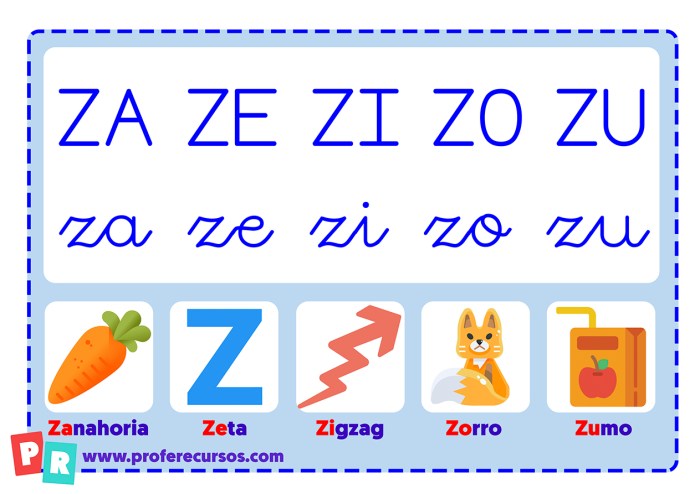
The Spanish sounds “za,” “ze,” “zi,” “zo,” and “zu” are pronounced as follows:
- “za”is pronounced like the “s” in “measure.”
- “ze”is pronounced like the “s” in “pleasure.”
- “zi”is pronounced like the “s” in “vision.”
- “zo”is pronounced like the “s” in “measure.”
- “zu”is pronounced like the “s” in “pleasure.”
Examples
Here are some examples of words that contain these sounds:
- “za”: casa (house), zapato (shoe), zona (zone)
- “ze”: cerveza (beer), mesa (table), pez (fish)
- “zi”: nariz (nose), lápiz (pencil), nariz (nose)
- “zo”: zapato (shoe), zona (zone), zorro (fox)
- “zu”: azul (blue), azúcar (sugar), zumo (juice)
Etymology
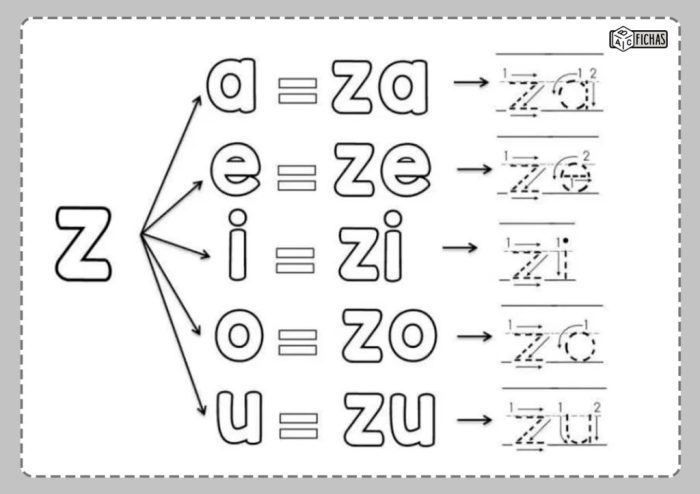
The Spanish words that contain the sounds “za,” “ze,” “zi,” “zo,” and “zu” have a diverse range of origins, including Latin, Arabic, and Basque.
In Latin, the sounds “za” and “zo” were often used to represent the Greek letters “zeta” and “omega,” respectively. For example, the Latin word “zona” (zone) is derived from the Greek word “zone,” meaning “belt” or “girdle.”
Arabic Influence
Arabic also had a significant influence on the Spanish language, particularly in the area of vocabulary. Many Spanish words that begin with “za” or “zo” are derived from Arabic, such as “zafar” (to succeed) and “zorro” (fox).
Basque Influence, Palabras con za ze zi zo zu
Basque, a non-Indo-European language spoken in the Basque Country of northern Spain and southwestern France, has also contributed to the Spanish vocabulary. Some Spanish words that contain the sounds “za,” “ze,” “zi,” “zo,” and “zu” are of Basque origin, such as “zarza” (bramble) and “zurdo” (left-handed).
Usage
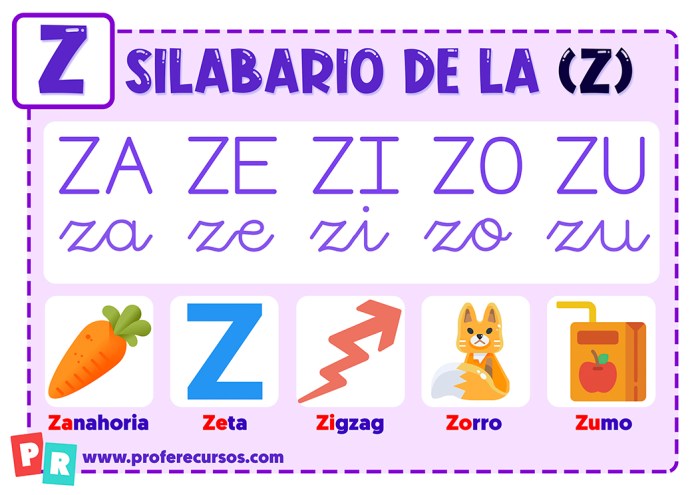
Words containing the sounds “za,” “ze,” “zi,” “zo,” and “zu” are frequently used in everyday Spanish speech, appearing in a variety of contexts and serving diverse functions.
Palabras con za, ze, zi, zo, zu son muy divertidas de decir. Si te gustan los desafíos geográficos, prueba este AP World Regions Map Quiz . ¡Te ayudará a memorizar los países y sus ubicaciones! Después, puedes volver a practicar tus palabras con za, ze, zi, zo, zu.
These words can be employed to express various concepts, emotions, and actions, ranging from describing physical characteristics to conveying feelings and describing objects or situations.
Examples
- Za:Used in words like “zapato” (shoe), “zanahoria” (carrot), and “zapato” (shoe), often denoting objects or actions related to footwear or cutting.
- Ze:Found in words like “cebra” (zebra), “zeta” (the letter Z), and “cemento” (cement), frequently appearing in names of animals, objects, and materials.
- Zi:Used in words like “zip” (zipper), “zorro” (fox), and “zorro” (fox), often describing objects, animals, or actions involving speed, cunning, or sharpness.
- Zo:Found in words like “zoológico” (zoo), “zorro” (fox), and “zona” (zone), frequently appearing in names of places, animals, or areas.
- Zu:Used in words like “zumo” (juice), “zurdo” (left-handed), and “zurcir” (to darn), often describing liquids, qualities, or actions related to sewing or handedness.
Regional Variations: Palabras Con Za Ze Zi Zo Zu
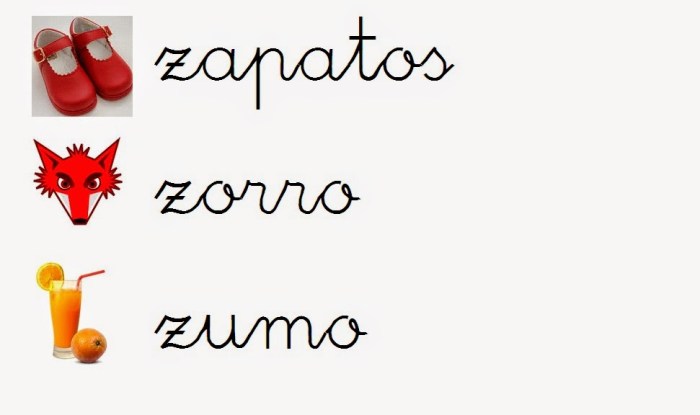
The pronunciation of the Spanish sounds “za,” “ze,” “zi,” “zo,” and “zu” can vary depending on the region of Spain. In some regions, these sounds are pronounced with a more pronounced “s” sound, while in other regions, they are pronounced with a more pronounced “z” sound.
For example, in Andalusia, the “z” sound is often pronounced as a “s” sound, while in Castile, the “z” sound is pronounced with a more pronounced “z” sound.
Examples
- In Andalusia, the word “casa” (house) is pronounced as “casa.”
- In Castile, the word “casa” is pronounced as “casa.”
Exercises
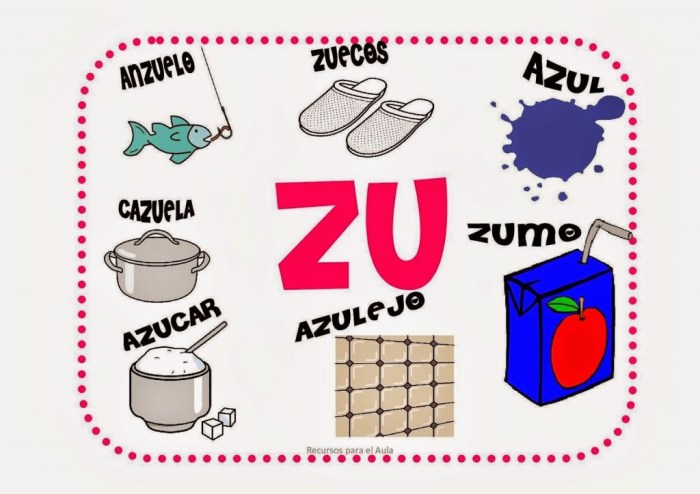
Practicing the pronunciation of “za,” “ze,” “zi,” “zo,” and “zu” sounds in Spanish is crucial for improving your fluency and comprehension. Here are a few exercises to help you master these sounds:
Tongue Twisters
- Zape el zapato con zapote.
- El zorro caza la liebre, y la liebre caza al zorro.
- Zipo, zape, zope, zuso, zupe.
Dictation Exercises
Listen to a native Spanish speaker pronounce words containing “za,” “ze,” “zi,” “zo,” and “zu” sounds. Write down what you hear. This will help you train your ear to recognize these sounds in context.
Listening Comprehension Exercises
Listen to Spanish conversations or audio recordings that include words with “za,” “ze,” “zi,” “zo,” and “zu” sounds. Pay attention to how native speakers pronounce these sounds and try to imitate their pronunciation.
Question & Answer Hub
¿Cómo se pronuncian los sonidos “Za”, “Ze”, “Zi”, “Zo”, “Zu”?
Los sonidos se pronuncian como sigue: “Za” como en “casa”, “Ze” como en “cebra”, “Zi” como en “zapato”, “Zo” como en “zoo”, “Zu” como en “azul”.
¿De dónde provienen las palabras españolas con estos sonidos?
Estas palabras tienen orígenes diversos, incluyendo el latín, el árabe y las lenguas indígenas.
¿Cómo se utilizan estas palabras en el habla cotidiana?
Estas palabras se utilizan en una amplia variedad de contextos, desde saludos hasta descripciones y acciones.